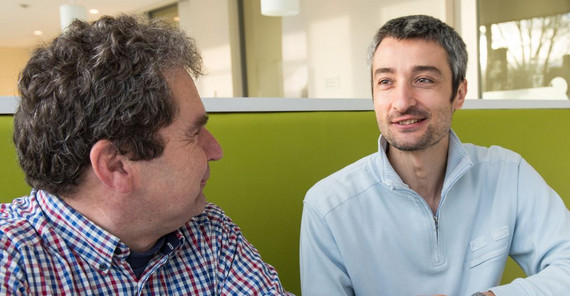He is looking forward to intensive research work with internationally acknowledged colleagues, excellent working conditions, exciting projects – and to Germany. Dr. Boban Arsenijevic is a linguist and one of the four BRAIN research fellows who have been working at the University of Potsdam since November 2014.
He is a brilliant linguist. He teaches and researches at the Faculty of Philosophy of the University of Belgrade and will be in Potsdam for the next two years. Dr. Boban Arsenijevic was granted a fellowship by the BRAIN program (Brandenburg Research Academy and International Network), which offers outstanding young international researchers post-doc fellowships at universities in Brandenburg for a period of two years. The program was developed by the Brandenburg Ministry of Science, Research and Cultural Affairs and is co-funded by the Marie Skladovska-Curie Actions of the EU.
The international jury has chosen Arsenijevic because of his excellence in grammatical theory research. He is now working with Prof. Dr. Gisbert Fanselow at the Linguistics Department. The professor holds the respective chair at the Faculty of Human Sciences.
Arsenijevic, who was born in Nis, Serbia, focuses his research on Slavic languages, particularly on Serbo-Croatian. The associate professor is also taken with biolinguistics, a new field of research that combines evolutionary biology, molecular genetics, primate and brain research, and theoretical linguistics.
Why linguistics? He already liked mathematics, computers, and programming as well as languages as a high school student. Linguistics combines all these fields and is an incredibly exciting science, says Arsenijevic.
When Fanselow suggested him to apply for the fellowship, the Serbian linguist had been in contact with the professor for quite some time although their research cooperation on left branch extraction in the Serbo-Croatian language took only place via the Internet.
He was very well received in Potsdam, enjoys the working atmosphere and exchanging ideas with colleagues. The main project for the next two years will be the analysis of subordinate clauses. Arsenijevic goes into raptures over conditional, temporal, causal, and complement clauses. His hypothesis: “The different kinds of subordinate clauses can be explained with the help of a single model. Their structure is always similar to relative clauses.” In Potsdam, the Serb is working in two research groups: the group led by Professor Fanselow (syntax) and the one led by Malte Zimmermann (semantics). During the summer semester 2015 Arsenijevic will hold a seminar at the Collaborative Research Center “Information Structure”, whose spokesperson is Zimmermann. He also wants to attend presentations, continuing education events, and symposia.
His wife and two children will follow him to Potsdam these days. The family is already looking forward to experiencing everyday life in Germany.
When you ask Arsenijevic how important the fellowship is for him personally, he does not have to think twice. “It is a great chance. I have the time and the means for intensive research in an optimal environment and can work together with topnotch colleagues,” he says. “I can intensify contacts, establish new ones. I can gain and exchange experiences.” The young scientist will be a gain for the University of Potsdam and the Linguistics Department in particular, his hosts emphasize. The University as a whole will also benefit: The linguist from Serbia makes it even more international.
Text: Ulrike Szameitat, Online-Editing: Agnes Bressa, Translation: Susanne Voigt

